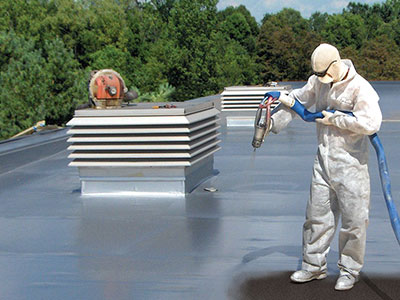Polyurea vs. Silicone vs. Acrylic: Which Roof Coating Wins?

As a roofing contractor, choosing the right roof coating system is essential for client satisfaction and a successful business. Whether you’re restoring an aging flat roof or protecting a new surface, the right coating can extend the roof’s life, improve energy efficiency, and reduce maintenance costs.
Polyurea, silicone, and acrylic roof coatings are three of the most common systems used in commercial and industrial roofing. Let’s explore each so you can determine which is best for your next roofing project and explain the pros and cons to your customers.
Polyurea Roof Coatings
Polyurea is a fast-curing elastomer created by reacting an isocyanate with a resin blend. It is known to be durable, flexible, and chemical-resistant.
Pros
- Rapid Cure Time: Polyurea will cure in just a few hours, allowing you to complete roofing projects quickly and efficiently.
- Durability: Polyurea roof coatings are incredibly durable and resist damage from weather, chemicals, water, and more.
- Versatile Application: You can apply polyurea to a variety of substrates, including concrete and metal.
Cons
- Cost: Polyurea is generally more expensive than silicone or acrylic roof coating options.
- Surface Prep Critical: Improper prep can lead to adhesion issues, so it’s important that you take the time and pay attention to weather and temperatures.
Best Use Cases:
- Industrial and commercial roofs that need high-performance waterproofing
- Areas with extreme climates and weather conditions
- Areas that experience heavy wear (like chemical plants or warehouses)
- Projects requiring fast turnaround times
Silicone Roof Coatings
Silicone is a moisture-cured roof coating option known for its excellent UV and water resistance.
Pros
- UV Resistance: Silicone won’t degrade or chalk over time due to sun exposure.
- Water Protection: Silicone performs well on flat roofs where water may pool.
- Low Maintenance: Silicone roof coatings require minimal upkeep, which many home and business owners appreciate.
- Easy Application: Silicone coatings are easy to apply with rollers, sprayers, or brushes.
Cons
- Slippery: Silicone coatings tend to be hazardous when wet unless textured, which generally isn’t a huge deal but is something to note for those who need frequent roof access.
- Dirt: This type of roof coating system tends to attract dirt and debris, which can reduce reflectivity and aesthetic appeal over time.
- Recoat Challenges: Not all coatings adhere well to cured silicone, making reapplication and any future repairs more complex.
Best Use Cases:
- Flat or low-slope roofs where ponding water is a major concern
- Homes or commercial buildings in hot, sunny climates where UV degradation is common
- Maintenance coatings over existing silicone roofs
Acrylic Roof Coatings
Acrylic coatings are water-based and cost-effective compared to other roof coating options. The lower cost makes them a popular option, particularly for commercial roofing applications.
Pros
- Cost-Effective: Acrylic generally has lower material and labor costs than other roof options.
- Easy to Work With: Water-based for easier cleanup and simpler application.
- Elastomeric Properties: Flexes with temperature changes to prevent cracking
Cons
- Water Resistance: Compared to other roof coating options, acrylic is the most likely to degrade over time due to water.
- Requires Multiple Coats: Acrylic roof coatings often need a thicker application for durability.
Best Use Cases:
- Sloped roofs with effective drainage
- Budget-conscious projects requiring moderate durability and reflectivity
- Temporary or maintenance coatings in mild climates
Which Coating Is Best?
| Feature | Polyurea | Silicone | Acrylic |
|---|---|---|---|
| Durability | ⭐⭐⭐⭐⭐ | ⭐⭐⭐⭐ | ⭐⭐⭐ |
| UV Resistance | ⭐⭐⭐⭐ | ⭐⭐⭐⭐⭐ | ⭐⭐⭐⭐ |
| Ponding Water Tolerance | ⭐⭐⭐⭐⭐ | ⭐⭐⭐⭐⭐ | ⭐⭐ |
| Cost | $$$$ | $$$ | $$ |
| Ease of Application | Requires training | Moderate | Easy |
| Best For | Heavy-duty, industrial | Flat roofs, UV exposure | Sloped roofs, budgets |
Ultimately, the best roof coating depends on your customer’s needs, climate, and long-term needs. In general,
- Polyurea is the top choice for performance and longevity in demanding environments.
- Silicone is ideal for flat roofs with ponding concerns and UV exposure.
- Acrylic is a great option when the roof is well-drained and in a mild climate.
Ready to Upgrade Your Roof Coating System?
There’s no doubt that roof coatings can help boost your profit margins and take your business to the next level.
Oak Ridge Foam & Coating Systems, Inc. specializes in high-quality coatings, spray foam systems, and application equipment. Whether you’re expanding your service offerings or tackling a large commercial roofing project, we have the expertise and products to help you succeed.
Contact us today for personalized training, product recommendations, or to schedule a demo of our spray systems for roof coating.
